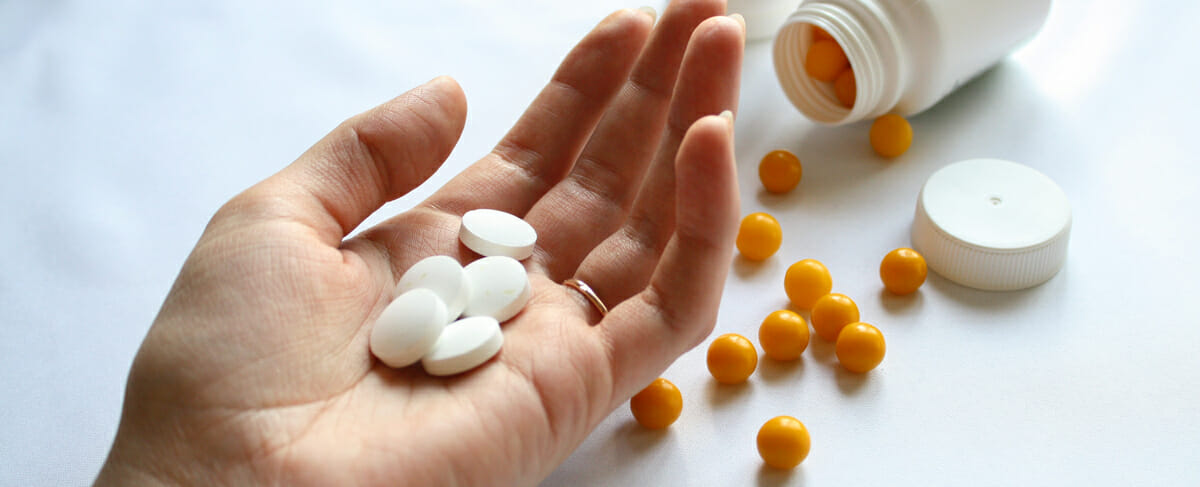Librium Explained
What is Chlordiazepoxide?
Chlordiazepoxide – also known by the trade name Librium, as well as by a large number of other names including Chlozepid, Clopoxide, Clordiazepossido, Contol, Decacil, Helogaphen, Ifibrium, Kalmocaps, Librinin, Limbitrol Ds, Lygen, Mesural, Mildmen, Multum, Napoton, Novo-Poxide, Psicosan, Radepur, Risolid, Silibrin, Tropium, Viopsicol, A-Poxide, Librelease, Libritabs, Menrium, Novo-poxide and methaminodiazepoxide – is a sedative and hypnotic of the benzodiazepine class, with amnesic, anticonvulsant, anxiolytic and muscle relaxant properties. Usually taken orally or intramuscularly, chlordiazepoxide was the first benzodiazepine to be synthesised (in 1959); in the UK it is a class C controlled substance.

What is Chlordiazepoxide Used to Treat?
Chlordiazepoxide is used for the short-term treatment of clinically significant anxiety (i.e., anxiety that is of such a scale as to be disabling and/or subjecting the sufferer to unacceptable distress). It is also commonly used in the management of acute alcohol withdrawal syndrome. In combination with other substances including clidinium bromide it can be prescribed to ease the symptoms of irritable bowel syndrome.
Why use Chlordiazepoxide for Alcohol Withdrawal?
Chlordiazepoxide is used to treat the symptoms of alcohol withdrawal, rather than the addiction itself: the prescription of chlordiazepoxide can help reduce the severity of withdrawal symptoms, including seizures and sickness, typically over a period of between five and 10 days. Untreated, alcohol withdrawal symptoms can prove fatal; moreover, reducing the severity of withdrawal symptoms makes withdrawal and detoxification a less arduous and distressing process, significantly reducing the likelihood of relapse.
How Do Medications for Addiction Treatment Work?
As with other benzodiazepines, chlordiazepoxide acts on the central nervous system neurotransmitter GABA, reducing the rate of information transfer across synapses in the brain, and thus producing a calming effect both psychologically and physically. This reduces the severity of withdrawal symptoms as well as any anxiety and agitation which may contribute towards the impulse to recommence drinking.
Is Chlordiazepoxide Effective at Treating Addiction?
Chlordiazepoxide by itself should not be seen as a treatment for addiction; rather, it aids in the treatment of withdrawal during a managed detoxification process, making relapse less likely and increasing the safety of the patient.
Principles of Effective Chlordiazepoxide Addiction Treatment
Chlordiazepoxide should be taken as part of a broader holistic addiction treatment programme such as that provided in a residential rehabilitation facility. The treatment of addiction rests upon therapy (in various forms) and medications such as chlordiazepoxide are used primarily in the treatment of specific withdrawal symptoms, rather than being cures in themselves. Because as with all benzodiazepines chlordiazepoxide is itself an addictive substance, and poses a risk of overdose, it should only ever be consumed in strict accordance with the instructions of the prescribing doctor.
Call our admissions line 24 hours a day to get help.
What are the Side Effects of Chlordiazepoxide?
As noted above, chlordiazepoxide can be habit forming and its consumption over time may result in tolerance and dependence, with withdrawal symptoms manifesting after the sudden cessation of use which may be fatal. Benzodiazepine withdrawal syndrome can resemble withdrawal from alcohol or barbiturates and can be fatal unless treated medically. Typically, the higher the dose and the greater the duration of consumption of chlordiazepoxide, the higher the risk that distressing and potentially dangerous withdrawal symptoms will manifest.
The consumption of chlordiazepoxide also poses a risk of overdose, with symptoms including difficulty staying awake, mental confusion, hypotension, impaired motor functions including muscle weakness and loss of balance, hypoventilation, and potentially coma and death. Chlordiazepoxide overdose is considered a medical emergency and requires immediate medical attention.
Other side effects associated with chlordiazepoxide include drowsiness, confusion, liver problems, fainting, constipation, irregularities with the menstrual cycle, changes to libido, nausea, skin rashes, fluid retention, and a yellowing of the eyes and skin.
Get Help Today
If you are struggling with an alcohol addiction – or if you have consumed chlordiazepoxide for sufficiently long or insufficiently high doses to develop a physical dependence – you should seek medical help for your condition. No addiction treatment may be successful until and unless the addict is prepared to acknowledge their condition and ask for help – but if you have reached that stage, there are facilities and organisations across the country which can give you the help you need. Speak with your GP and/or an addiction specialist today to discuss treatment options which may be available to you, and take back control of your life.
Call our admissions line 24 hours a day to get help.
No matter where you live, there is a drug rehab center that can help you overcome your addiction. We'll help you find it.
Select a County



